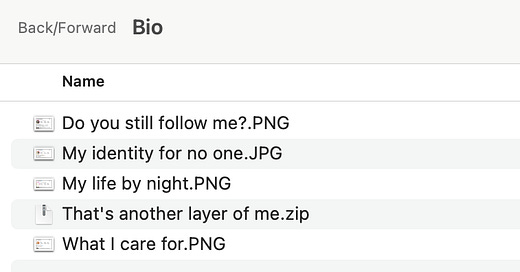.zip Identities: Miniaturization vs. Compression of Our Digital Selves
Social media bios, which seem designed to miniaturize our identities, have quietly become the stage for a grand act of subversion.
Tuesday evening on Earth. Thank you for reading this letter. Feel free to share and recommend.
Long seen as a formality, online biographies have evolved into an aesthetic and functional standard.
150 characters to say who we are. A demand for concision but also for clarity, consistency, and desirability.
What should be a space for self-presentation has become a branding test. A micro-showroom for the self, optimized for attention. At best, an identity haiku. At worst, a digital coffin. As if it were normal to sum ourselves up in so few words.
Against Miniaturization: The Strategy of Compression
We're urged to tell our lives like trailers. Every element of our profile (photo, name, handle, bio…) becomes a marker in an algorithmic storyline. And yet, it's precisely within these rigid frames that the most subtle forms of resistance emerge.
The more refined the logic, the more clever the sabotage.
Paradoxically, as the pressure to perform grows stronger, it's creators and public figures who are leading the bio backlash.
Among models, musicians, and content creators, bios are often stripped of any personal identity:
“Agency: contact@xyz.com”
“For inquiries: agentlink.co/me”
This stripping down isn’t a lack, it's a choice. A gesture. An externalization of identity.
The real narrative unfolds elsewhere: in images, collaborations, press coverage. In whispers and echoes.
Others embrace ambiguity, inviting interpretation. Take Hantoring, for instance: her bio says almost nothing. Not a souvenir shop, but an antechamber. A riddle, a decoy.
Those who know, know. It’s a logic of implicit belonging. A form of partial storytelling, open-ended, just as Umberto Eco imagined in The Open Work.
The profile isn’t there to explain everything. It’s there to be completed by the viewer.
And then, some opt for complete erasure.
Amelia Gray and Hunter Schafer, for example, have removed everything: no bio, and in Amelia’s case, even a subverted default profile picture.
A radical move, close to post-attention minimalism—where scarcity creates magnetic tension. It echoes ghost posting or the aesthetics of blank posts: saying a lot by saying almost nothing.
.zip Identity: Compress to Radiate
What we’re seeing is not a collapse of identity, but a strategic shift. Rather than miniaturizing as in shrinking to fit some choose compression as in reducing to hold more.
The bio becomes a compressed file. A discreet container whose contents are only revealed through interaction: in archives, pinned stories, comments, traces.
It demands opening, digging, decoding. Link-in-bio tools like Linktree act as subfolders, branching out into different aspects of the self. Identity becomes modular, distributed. This is also a way of reclaiming narrative agency in an environment that demands everything, immediately.
We’re no longer just here to be seen; we’re here to be discovered.
The Stat of the Week: +1M
According to Socialblade, PSG gained over 1 million new followers in 24 hours after their victory over Inter Milan.
Amazing links
An interview of me on why I think the Internet can still be beautiful (Nikita Walia)
The improbable rise of chessboxing (The Economist)
The Nostalgia Machine (Burn After Reading)
Have a great week! This newsletter is written with love, passion, and (French) coffee. Feel free to share this newsletter, like, comment, or keep sending me emails: these notifications are a joy.
My book “Alive In Social Media” is still available on Amazon.





